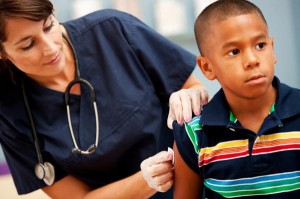11-Year-Old Boys Should Get HPV Vaccine, Doctors Advise
Feb 27th, 2012
 Boys 11 years old and above should be given Gardasil vaccine to help protect them against Human Papillomavirus (HPV) infections, which causes genital warts and certain cancers like oral, penile, and anal, according to the nation’s biggest group of pediatricians.
Boys 11 years old and above should be given Gardasil vaccine to help protect them against Human Papillomavirus (HPV) infections, which causes genital warts and certain cancers like oral, penile, and anal, according to the nation’s biggest group of pediatricians.
“We are trying to push Gardasil as a cancer vaccine,” according to Dr. Michael Brady of the American Academy of Pediatrics (AAP). “This gives us the capacity to stop the spread and the development of certain types of cancer.”
This statement was based on the recommendations made by the U.S. vaccine advisers and revises the previous stance of the AAP, which until now had only promoted vaccination for girls.
HPV is the most prevalent sexually transmitted disease in the U.S. The Centers for Disease Control and Prevention (CDC) declared that at least half of all sexually active individuals will be infected with HPV at some point in their lives.
HPV infections do not cause any symptoms and resolve on their own. But some types of this virus may cause genital warts and in rare cases, cancer. HPV types 16 and 18 in particular are believed to be responsible for 7,000 cancer cases in men in the U.S. every year and 15,000 cases in women, mostly cervical cancers.
Clinical studies reveal HPV vaccines protect males against genital warts and anal cancer, although this protection may be incomplete. In addition, vaccinating boys can also indirectly protect women from the virus by interrupting its spread, the AAP said.
The recommended amount of three doses costs around $360. Health regulators in the country did not find any serious side effects aside from soreness at the site of injection.
“This is a safe and effective vaccine,” Dr. Brady agreed. “Using the vaccines on boys aged 9 through 15 will make them most effective. However, boys and men up to 21 years old can still be vaccinated.”
The AAP still recommends three shots of Gardasil or GSK’s Cervarix for 11- and 12-year-old girls. But girls and women up to 26 years old should be vaccinated if they fail to get their shots.
In 2010, a third of the teenage girls in the U.S. received all three shots, but Brady said that is not enough to stop the spread of the virus.
“Hopefully, the government’s recent move to include boys in its vaccine recommendations will improve coverage and reduce cost barriers,” Brady said. Improved access through health insurance coverage is likely to contribute to more widespread protection against HPV.
Related posts from our blog:
No related posts.
Tags: HPV